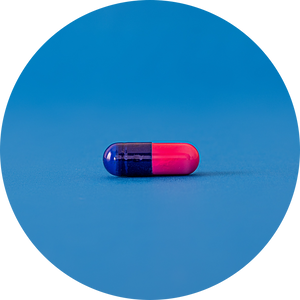Sex is great. It's pleasurable, it's intimate, it builds connection among partners, and it can even be relaxing.
At least, it should be. Constantly worrying about how well you're performing can seriously impair enjoyment – and even further derail your performance. In fact, too much worrying can lead to sexual anxiety and even erectile dysfunction.
Performance anxiety is something men don’t often talk about despite that it's quite common among sexually active adults. These are a few ways that you can ease concerns about your performance and feel the good kind of rapid heartbeat with your partner.
What Is Performance Anxiety?
Sexual activity is physically demanding activity, but there's more to sex than where and how you maneuver your body. Your emotions, mood, and mental state also play important roles in arousal, sexual desire, and your overall sexual experience.
Consistently feeling stressed or worried that you aren’t pleasing your partner can eventually lead to physical symptoms. These thoughts are known as performance anxiety, and as many as 25 percent of men deal with the issue.
The exact triggers of these feelings are specific to each guy, but some of the most common causes involve:
- Fear of a poor or unsatisfactory performance
- Poor body image
- Issues in the relationship
- Concerns over penis size
- Worried about ejaculating too soon or taking too long
- Anxiety about not enjoying the experience
- Excessive use of pornography
- Low self-esteem
What Are Examples of Performance Anxiety Symptoms?
Some possible symptoms of performance anxiety include premature ejaculation, delayed orgasm, and a reduced sex drive. However, these are less common than the most common effect: erectile dysfunction.
The symptoms of performance anxiety are just like its causes — they're unique to the individual. The type and severity of sexual dysfunction can vary significantly from person to person, and it can be difficult to predict.
What Is Erectile Dysfunction?
Erectile dysfunction is the difficulty achieving or maintaining an erection firm enough for sex.
It’s estimated that nearly 30 million men in the United States frequently experience these difficulties. While it’s common to have an erection-related difficulty from time to time, it’s not normal for it to occur regularly. If erection problems are happening frequently, there's a good chance it's diagnosable ED.
In most cases, erectile dysfunction is caused by an underlying medical condition that has an impact on blood flow and circulation. Physical conditions such as high blood pressure, diabetes, heart disease, sclerotic arteries, and obesity are some of the most common risk factors for erectile dysfunction.
However, it can also be caused by psychological factors such as performance anxiety, stress, anxiety disorders, or depression.
The relationship between erectile dysfunction and performance anxiety can also be cyclical in nature. Basically, one often leads to the other, regardless of which started first. In theory, this means that treating one issue can have a positive impact on the other too.
How Do You Treat Erectile Dysfunction Caused by Performance Anxiety?
It’s not always easy to treat mental health issues, as every situation is unique and brain chemistry varies dramatically.
With performance anxiety-induced erectile dysfunction, rather than tackling self-confidence first, it can be easier to treat the physical causes of erectile dysfunction and hope that this reduces anxiety in turn.
The most effective erectile dysfunction treatments, most of which tackle the physiological facets, include:
Prescription ED Medications
The easiest option first.
Using a prescription ED medication such as Viagra®, Cialis®, or Levitra® can make it much easier to achieve and maintain an erection, even if you’re having some mental "stage fright."
These drugs are all classified as phosphodiesterase type 5 (PDE5) inhibitors and work the same way. By blocking an enzyme located in the walls of your blood vessels, PDE5 inhibitors are able to keep your blood vessels dilated for longer. This allows more blood to flow into your penis and fill the soft tissues located there. In fact, your penis holds 5-7 times as much blood as usual during an erection!
PDE5 inhibitors work for the majority of men who try them. They basically release the body's brakes on the erection process, helping guys get and maintain an erection for longer. While they do require arousal (don't expect to pop a pill and get a boner), they may still help in performance anxiety situations.
Exercise
Erections rely on great blood flow. Anything that's good for your circulation is good for your erections.
Getting more physical exercise can help to improve the strength of your cardiovascular system and improve overall blood flow.
A 30 minute daily walk is enough to help for most people. More significant results may take more than that. You should aim to get at least four 40-minute workout sessions of moderate intensity every week. After a few months, you should be able to notice improvements in cardiovascular abilities, blood flow, and erections.
The benefits of exercise aren’t just physical, as regular exercise can improve mood as well thanks to various hormones and neurotransmitters that get a boost with the right exercise. When you exercise, your brain releases serotonin and dopamine, which will help you to relieve tension and stress. Improving your mood could help to reduce the severity of performance anxiety.
With exercise of that regularity, you'll also likely be losing weight and feeling more fit. That can help to boost your self esteem and improve your body image too.
Exercise is genuinely win-win.
Therapy
Stress is a major contributor to both performance anxiety and erectile dysfunction. Finding healthy ways to manage stress can help you to combat both issues at the same time.
Talking with a therapist about your performance anxiety can help provide insights into why you feel the way you do. A good therapist might also suggest ways to help you accept yourself and relax in the bedroom. This type of thought-reframing is called cognitive behavioral therapy, and it’s used for many types of anxiety.
Yoga, meditation, breathing exercises, and mindfulness are also a few examples of stress management techniques that may help.
The Takeaway
It’s common to feel nervous or anxious about your sexual performance from time to time. Every man wants to feel like he can satisfy his partner every time, but this feeling can also create anxiety about upcoming intimacy. It can even lead to premature ejaculation, delayed orgasm, a reduced sex drive, or even erectile dysfunction. ED medications can help, as can exercise, therapy, and lifestyle changes.
If you think performance anxiety is leading to your erectile dysfunction, there are solutions.
Get back in the bedroom with prescription ED meds like generic Viagra from Rex MD. If prescribed, they're shipped to your door in discreet packaging. Your consultation is free, your shipping is free, and you can access your clinician any time through our Member Portal.
SOURCES
Sexual Performance Anxiety | PubMed
Performance anxiety and erectile dysfunction: Causes and how to cope | Medical News Today
Erectile Dysfunction (ED) | NIDDK.
Definition & Facts for Erectile Dysfunction | NIDDK.
Erectile Dysfunction. | PubMed
[Psychological factors involved in erectile dysfunction] | PubMed
Phosphodiesterase-5 (PDE5) Inhibitors In the Management of Erectile Dysfunction | NCBI
Walking for good health | Better Health
Physical Activity to Improve Erectile Function: A Systematic Review of Intervention Studies. | NCBI
Exercise Benefits Brain Function: The Monoamine Connection | NCBI













